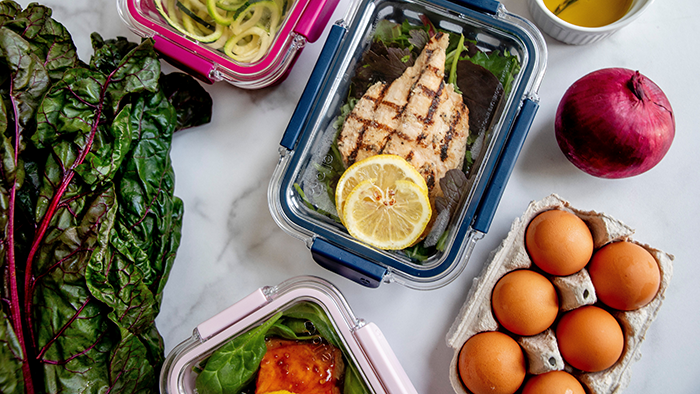We use cookies to make your experience better. To comply with the new e-Privacy directive, we need to ask for your consent to set the cookies. Learn more.
Staple Foods To Begin Your Fitness Journey

Beginning your journey can be daunting.
A common mistake that many beginners make is trying to change everything at once. Don't fall into this trap! Making small gradual changes in your eating pattern is key, as it allows the body to get used to the new behaviours, and ultimately establish new eating habits that can be sustained for a lifetime.
Below are 20 staple foods to kick off your fitness journey, as well as a printable take-home shopping list that you can bring with you on your next trip! Stock up with these handy ingredients and make your life easier!
-
Oats
Oats are highly nutritious. They contain vital vitamins, minerals, and antioxidants. They also contain a powerful soluble fiber called Beta-Glucan, which aids in the reduction of cholesterol and blood sugar levels, and also promotes healthy gut bacteria. Oats are one of the cheapest products you can find in the shop. Tesco sell their own brand for 66c (1kg of oats).
-
Chicken Breast
While chicken breast is low in calories, it is very high in protein. One chicken breast contains roughly 30g of protein. Plus, it's extremely versatile!
-
Frozen Spinach
Spinach is rich in many vitamins and minerals, particularly vitamin K. Frozen spinach is great as you get more for your money, and don’t have to worry about it going off (fresh spinach can go off quite quickly). Try adding this to smoothies, omelettes, curries, and other one-pan dinners.
-
Bananas
Bananas are extremely convenient and portable, thus perfect for a snack on-the-go. They are also great to use in baking.
-
Whey Protein
Taking whey protein is a quick and easy way to increase your protein intake. Whey protein will help prevent muscle breakdown, build muscle, promote fat loss (1), and also help support the immune system. Try ours here!
-
Yoghurt
Yoghurt is produced from milk that’s fermented by adding live bacteria to it (known as probiotics). Probiotics help repopulate your gut and fight off bad bacteria. However, it is important to note that yoghurts that go through heat treatment have no active bacteria, which ultimately reduces the health benefits.
-
Butter beans
Like many beans, butterbeans are high in fiber. A ½ cup of butter beans contains approximately 53% of your recommended daily requirement.
-
Potatoes
Potatoes are an excellent source of vitamins and minerals, such as vitamin C and fiber. Potatoes have been linked to many health benefits, including reducing inflammation, regulating blood sugar and reducing cholesterol.
-
Broccoli
Broccoli is a cruciferous vegetable that tastes great both raw and cooked. It is also rather high in protein in comparison to other vegetables.
-
Frozen Mixed Berries
Berries are loaded with antioxidants (especially blueberries). Antioxidants are molecules that support the immune system by protecting cells from free radicals. Antioxidants have the ability to stabilize free-radicals (highly reactive molecules), stopping them from causing unnecessary harm (2). While fresh berries can be expensive, frozen berries are rather cheap.
-
Carrots
Carrots are very high in beta carotene, a provitamin A carotenoid (a nutrient that the body readily converts into vitamin A). Consuming a diet rich in carotenoids has been found to support eye health and prevent eye diseases.
-
Cacao Powder
Cacao powder is rich in flavonoids, which has been shown to help reduce blood pressure, improve blood flow to the brain and heart, prevent blood clots, and fight cell damage. It is also an extremely good source of magnesium, antioxidants, calcium, zinc, copper and selenium.
-
Mushrooms
Mushrooms are one of the few non-animal sources of vitamin D. When they are grown, they are exposed to UV light which increases the concentration of vitamin D.
-
Bell Peppers
Bell peppers are extremely rich in vitamin C. Vitamin C plays numerous roles within the body and has been linked to various health benefits such as increasing antioxidant levels, iron absorption and immunity (3), as well as decreasing blood pressure and inflammation. It may also help prevent acute respiratory infections, particularly in individuals with malnutrition and those who are physically stressed.
-
Smoked Salmon
Smoked salmon is rich in omega-3 fatty acids EPA and DHA, which play important roles in many bodily processes, such as inflammation, heart health, and brain function (4).
-
Sourdough Bread
Sourdough bread has lower phytate levels than regular white or whole bread, making it easier to digest. Sourdough bread also contains naturally occurring bacteria as well as fiber which acts as a prebiotic (food for gut bacteria). Moreover, it contains an adequate amount of protein, having approximately 8-9g per 100g.
-
Eggs
Eggs are incredibly nutritious, containing a little bit of almost every nutrient you need. Eggs are referred to as a ‘complete protein’, since they contain all the essential amino acids. Amino acids are essentially the building blocks of protein, and proteins are the building blocks of muscle mass (5).
-
Almonds
Almonds contain plenty of nutrients. This includes magnesium, vitamin E, iron, calcium, fiber and riboflavin.
-
Passata
Passata is a great alternative for tomato ketchup. Passata is uncooked tomato puree without seeds or skins. Passata can be used in any recipe that calls for tomatoes.
-
Avocado
Avocados are full of nutrients. They are also rich in monounsaturated fats that help to protect against heart disease and lower blood pressure (6).
Click here to download your 20 Staple Foods to Begin Your Fitness Journey Shopping List!
Good luck!

